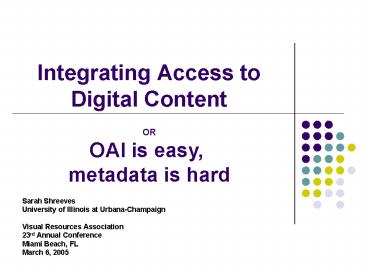Integrating Access to Digital Content - PowerPoint PPT Presentation
1 / 23
Title:
Integrating Access to Digital Content
Description:
37% of visits to images of the. State Library of New South Wales ... Sheet Music Consortium (inactive) Digital Library Federation Best Practices ... – PowerPoint PPT presentation
Number of Views:47
Avg rating:3.0/5.0
Title: Integrating Access to Digital Content
1
Integrating Access to Digital Content
OR OAI is easy, metadata is hard
- Sarah Shreeves
- University of Illinois at Urbana-Champaign
- Visual Resources Association
- 23rd Annual Conference
- Miami Beach, FL
- March 6, 2005
2
Why Integrate Access?
- Increase access to your collections
- 37 of visits to images of theState Library of
New South Wales came through the
PictureAustralia portal - Aggregation and exposure of the hidden web
- Build a digital library out of digital
collections - Services - (Curriculum support, exhibits, new
scholarly possibilities) - Enabling collaborations among resource developers
3
Collection Registries
4
Search interoperability
- the ability to perform a search over diverse
sets of metadata records and obtain meaningful
results. - Priscilla Caplan
- Metadata Fundamentals for All Librarians
5
Keys to Search Interoperability
- Organizational commitment
- Communication protocol (Z39.50, OAI, etc.)
- Standards, Standards, Standards
6
Sharing metadata Federated search
- The distributed databases are searched directly.
Mill?
For Example Z39.50, SRU/SRW
7
Sharing metadata Data aggregation
- The user searches a pre-aggregated database of
metadata from diverse sources.
Mill?
For Example Search engines, union catalogs, OAI
8
What is the Open Archives Initiative Protocol for
Metadata Harvesting?
- A tool to move metadata from one place to another
- Misconceptions about OAI
- OAI ? Dublin Core
- OAI ? Search Protocol
- OAI ? Content (though this is changing)
9
(No Transcript)
10
The Basics of OAI
- Data providers expose metadata
- Service providers harvest metadata
- All interactions based on HTTP and XML
- Requires use of simple Dublin Core BUT supports
use of other metadata schemas - Open source software available for both data and
service providers - Currently 560 data providers and far fewer
service providers
- Identify
- ListMetadataFormats
- ListSets
- ListIdentifiers
- GetRecord
- ListRecords
Admin.Verbs
Content Harvesting
11
OAI Use of Dublin Core
- DC is OAIs lowest common denominator
- BUT
- OAI supports encourages use of other
community-driven metadata schemas - BUT
- Metadata schema MUST have an XML Schema (XSD) for
validation purposes
12
Decides what metadata format to harvest
Harvests metadata in most appropriate format
Index andmake available inservice
Analyzes metadatafor quality issues and general
processing
- Cleans up metadata
- Empty or useless fields
- Determine primary URL
- Processing specific types of information
- Applying encoding schemes
Maps to service metadata format
13
Challenges for the OAI Community
- Wide variety of domains involved
- Best practices still in development
- What is shareable metadata anyway?
14
The Problems for Service Providers
- Metadata written for different users and uses
- Dublin Core is not semantically complex
- The one to one rule
- Loss of contextual information (the on the
horse problem) - Inconsistency within and across data providers
- Turnkey systems are incorporating OAI at the
minimal level
NEXT
15
(No Transcript)
16
Metadata for different communities
17
Metadata for different communities
BACK
18
Granularity of Description Excerpt of Metadata
Record Describing American Woven Coverlet
19
Granularity of Description Excerpt of Metadata
Record Describing "Cotton coverlet with
embroidered butterfly design"
BACK
20
What is Shareable Metadata for the Visual
Resources Community?
- Contains the necessary semantics/structure
- VRA Core, CCO-lite, MODS, MARC, Qualified DC
- Is appropriate for its content
- Uses standards and best practices for content
- Cataloging Cultural Objects Controlled
Vocabularies - Provides context (the on the horse problem)
- Collection level description can help
- Is consistent
- Has documentation
- What does your service provider need?
21
Community based efforts
- Open Language Archives
- Sheet Music Consortium (inactive)
- Digital Library Federation Best Practices
- National Science Digital Library
- Visual Resources?
22
A Last Word
- We are beginning to explore how to share
metadata for the digitized collections, and have
very good technical solutions, but this has not
yet matured into a well understood set of
services. This is one aspect of what I meant when
I said that this activity was in the 'cottage
industry' stage. - Lorcan Dempsey
- http//orweblog.oclc.org/archives/000602.html
23
Contact Information
- Sarah Shreeves
- Project Coordinator,
- IMLS Digital Collections and Content Project
- University of Illinois at Urbana-Champaign
- sshreeve_at_uiuc.edu
- 217-244-7809































